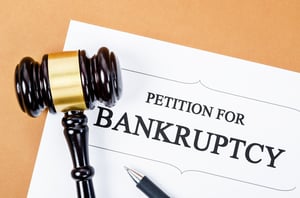 Bankruptcy provides tremendous relief to people who become unable to pay back their debts. After the debtor receives their bankruptcy discharge, their creditors are forever legally prevented from undertaking further debt collection efforts against the debtor, with certain limited exceptions (i.e. generally student loan debt, domestic support obligations, and most income tax debt remain collectable).
Bankruptcy provides tremendous relief to people who become unable to pay back their debts. After the debtor receives their bankruptcy discharge, their creditors are forever legally prevented from undertaking further debt collection efforts against the debtor, with certain limited exceptions (i.e. generally student loan debt, domestic support obligations, and most income tax debt remain collectable).
Sometimes, after receiving a bankruptcy discharge, the debtor may incur more debt and may again become financially unable to pay it back. For this reason, the Bankruptcy Code allows debtors to file multiple bankruptcy cases with certain limitations.
Once a debtor receives a discharge in their first chapter 7 case, they must wait 8 years from the date that they filed their first chapter 7 case to file another chapter 7 bankruptcy case and receive a discharge in the second case. The debtor must wait 4 years from the date they filed their chapter 7 case to file a chapter 13 case and receive a discharge in that case. If the debtor’s first bankruptcy case is a chapter 13, the debtor must wait 6 years from the date of filing the chapter 13 case before they can file a chapter 7 case and receive a second discharge. The debtor must wait 2 years from the date that they file their first chapter 13 case before they can file another chapter 13 case and get another discharge. This is a bit confusing, as a chapter 13 lasts a minimum of 3 years (up to 5 years) from the date of filing until discharge. This essentially means that a person can file a second chapter 13 case, at any time, after receiving their first chapter 13 discharge, as provided by the Bankruptcy Code. The Bankruptcy Courts have confirmed that a person may file a second chapter 13 bankruptcy case, at any time, once two years have passed since the filing their first chapter 13 bankruptcy case.
It is important to take note that these time periods only apply to cases in which the debtor actually received a discharge in their first bankruptcy case. If the debtor had their first case dismissed without receiving a discharge, they will not need to wait to file a new chapter 7 or 13 case. An exception to this rule is if the court dismissed the debtor’s case for failure to obey a court order or if the debtor voluntarily dismissed their own case in response to a motion for relief from the automatic stay filed by a creditor (i.e. the creditor asks the court for permission to repossess a car during the debtor’s bankruptcy case for which debtor is not paying). In these cases, the debtor may not file another bankruptcy case, chapter 7 or 13, less than 180 days after their case is dismissed.
It is also important to consider the fact that these time frames do not prevent a debtor from actually filing a second bankruptcy case until the requisite amount of time has passed since the filing of their first case. It merely prevents them from being able to receive a discharge in their subsequent bankruptcy case. This is important because, in some circumstances, it may be beneficial for a debtor to file a chapter 13 bankruptcy case even if 4 years have not elapsed since they filed a chapter 7 bankruptcy case. An example of such a situation would be if the debtor falls behind on car or home payments since their chapter 7 discharge. In such a case the debtor may want to consider filing a chapter 13, even if 4 years have not passed since their chapter 7 case filing, to allow them an opportunity to get caught up on the car and/or home payments during the bankruptcy and avoid a repossession or foreclosure during the bankruptcy with the protection of the automatic stay. In such cases, a discharge is not needed, but rather, an opportunity to restructure, and get caught up on, their delinquent payments.
CALL NOW FOR A FREE STRATEGY SESSION FROM A MN BANKRUPTCY LAWYER AT LIFEBACK LAW FIRM
If you are considering filing for either chapter 7 or chapter 13 bankruptcy, you should first seek a consultation with an experienced bankruptcy to discuss your options and make sure you file your case correctly, and with the greatest benefit to you, in light of your personal circumstances. See us at LifeBackLaw.com!


